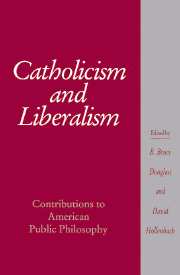Book contents
- Frontmatter
- Contents
- List of contributors
- Preface
- Introduction
- PART I HISTORICAL CONFLICTS AND DEVELOPMENTS
- 1 The failed encounter: the Catholic church and liberalism in the nineteenth century
- 2 American Catholics and liberalism, 1789–1960
- 3 Vatican II and the encounter between Catholicism and liberalism
- 4 Liberalism after the good times: the “end of history” in historical perspective
- PART II NEW ENCOUNTERS AND THEORETICAL RECONSTRUCTIONS
- PART III PRACTICES AND INSTITUTIONS
- Afterword: a community of freedom
- Index
3 - Vatican II and the encounter between Catholicism and liberalism
Published online by Cambridge University Press: 19 February 2010
- Frontmatter
- Contents
- List of contributors
- Preface
- Introduction
- PART I HISTORICAL CONFLICTS AND DEVELOPMENTS
- 1 The failed encounter: the Catholic church and liberalism in the nineteenth century
- 2 American Catholics and liberalism, 1789–1960
- 3 Vatican II and the encounter between Catholicism and liberalism
- 4 Liberalism after the good times: the “end of history” in historical perspective
- PART II NEW ENCOUNTERS AND THEORETICAL RECONSTRUCTIONS
- PART III PRACTICES AND INSTITUTIONS
- Afterword: a community of freedom
- Index
Summary
The Second Vatican Council can be read as the event in which the Catholic church significantly reassessed modern society and culture and the attitudes and strategies it had adopted towards them in the previous century and a half. Those earlier attitudes and strategies had been founded in a consistent repudiation of an ideology and praxis summed up in the word “liberalism.”
“Liberalism” is, of course, notoriously difficult to define, and the history we are studying in this volume is in good part also a history of interpretations and evaluations of the word. But in the minds of most Catholic popes, bishops, and apologists over the last two centuries, it had a clear reference which may first be illuminated by the literally diabolical lineage they imagined for it. Liberalism had its origins in Satan's “Non serviam” but only took on systematic form in the Lutheran revolt against the church's authority and on behalf of free examination, in the naturalism of the Renaissance, in the Enlightenment's repudiation of tradition, authority and community, in the secularization of the political sphere, in the possessive individualism of capitalist economics, and in the cultural anarchy produced by an unrestrained freedom of opinion, speech, and the press. Common to all these developments were an exaltation of the individual and a definition of freedom as exemption from external constraint.
If on this view the original sin that gave rise to liberalism was Satan's and Adam's rejection of God's will, its modern triumph was accomplished by the emancipation of large areas of human life from the Lordship of Christ exercised through the teaching and laws of the church.
- Type
- Chapter
- Information
- Catholicism and LiberalismContributions to American Public Policy, pp. 76 - 99Publisher: Cambridge University PressPrint publication year: 1994
- 9
- Cited by

